#most of these are BBC productions
Explore tagged Tumblr posts
Text
I caved under the pressure of Valentines day and made a historical romance recommendation list. Fuck.

Here’s some Mr. Thornton for you.
Read the rest here: https://open.substack.com/pub/ananyajagoorie/p/romance-is-in-the-air?r=7dcr2&utm_campaign=post&utm_medium=web
#historical romance#recommendations#movies#tv shows#north and south#north and south BBC#pride and prejudice#Emma 2009#emma#wives and daughters#most of these are BBC productions
4 notes
·
View notes
Text
guess who managed to mention dnp in his a level media exam 🔥🔥
#okay it was relevant i promise#basically okay the question was about to what extent is it vital for media products to identify and address a target audience to be#successful and we study 2 radio products#one is newsbeat which is by the bbc it's like a news radio show that's meant to target age 15-29#but the average listener is 30#so . it is Not effectively targeting its audience#it gives . how do you do fellow kids#like it tries really really hard to appeal to young adults/teenagers but it's . painful to listen to sometimes#the bbc have been trying to target this age bracket coz it's the one they don't have a secure audience in#I SAID that they used to have a slightly bigger younger audience in the early 2010s#bcos they had the dan and phil show on radio 1 which was very popular and attracted their mainly teenage/young adult presold audience#they used the popularity of the internet to their advantage by having dnp run a show#but now they've lost a lot of their younger audience To social media platforms#as now what are called digital natives in media (people who have grown up with the internet/don't really remember a time before it)#for the most part prefer to get their news off social media rather than radio#a lot of this is general i know not Every young person Hates radio#but in general it's losing popularity esp amongst younger target audiences#media 🔥🔥🔥🔥#that was only like . a mention in one paragraph tho#coz unfortunately we don't study dnps radio show we study Newsbeat 😔#anyway the exam was overall good for the most part#yay :3#joeyposting
8 notes
·
View notes
Text
I was feeling impatient so I decided to end the first poll early since these two were pretty far in the lead
Edit: consider what you would submit‚ what you’d vote for‚ stuff like that
Also note that this is only one day long SPEEDROUND
After I get the results of this‚ I’ll probably post a submissions form within the day.
#I’ll probably end up doing both of these at some point so it’ll be very fun to see repeat submissions lol#polls#poll#season2#episodeoftv#tournament#also: best is pretty self-explanatory#but worst could include finales that were bad bc of early cancellation#or other production issues#.#I do see your GoT comments and I have to disagree bc I don’t think many people on here actually give a shit about that show#its episodes got knocked out very fast in round 1#I just don’t think this blog’s audience has the emotional attachement to push it through past like. round 3.#Supernatural on the other hand. maybe it couldn’t get very far in the most tournament but I do think that could be a pretty easy sweep#up to the quarterfinals at least.#…#also it’s like you guys don’t even remember bbc sherlock.#I don’t either that’s how bad it was.
21 notes
·
View notes
Text
Every year, I tell myself that I should really consider taking off work for Father Brown premiere day, and then it comes around and I forget to do it, and I spend all day thinking about how I would so much rather be sitting cozy under a million blankets and going back to Kembleford than being forced to do boring work things.
#father brown#honestly i miss the old release schedule model#i loved having just a nice little ep to look forward to every day for two (and sometimes three) full work weeks#now they just put them on iplayer all at once but only air one a week#so its the worst of both worlds#i either watch them all at once b/c i have no impulse control#but do so with the understanding that the fandom may be pacing themselves w/ one a week instead#OR#i force myself to slow down but am grumpy about it#b/c for years the bbc would give me the perfectly prescribed little dose of serotonin in early-jan just when i needed it#the old system was great; why did they change it#an ep a day for 2-3 weeks was just the best way to pace it#i know there's a former higher up at the beeb that just hates the show#b/c it's much more expensive to produce than the average daytime show --even it more than makes up for production costs#by being the single most exported show from the channel to foreign markets (yup even more than doctor who)#so i can't help but wonder if the new release model is an attempt to kill the show by some other bitter exec#well jokes on them cause it didn't work last year and i pray that it won't work this year as well#am a bit worried about the sister boniface spinoff's future ngl#i think i did hear that it was getting an s3 and i think britbox funding it rather than the been directly does help it#but still a bit worried
10 notes
·
View notes
Text
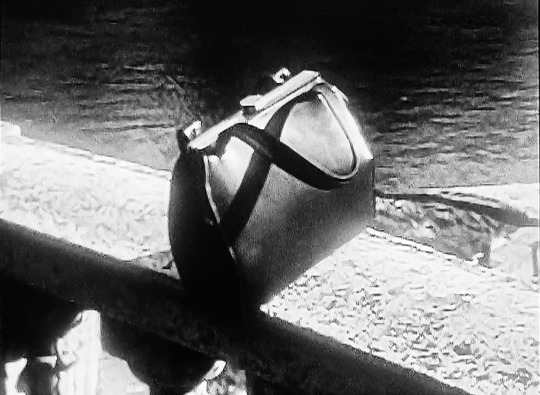

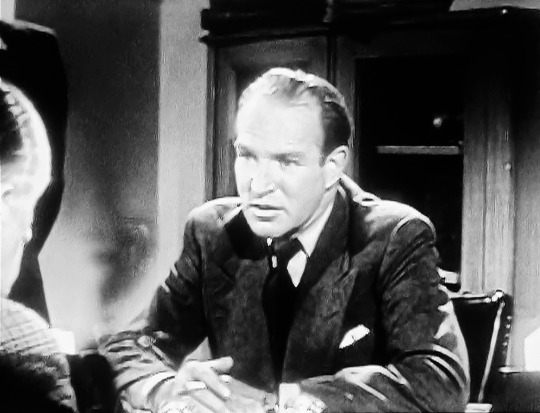
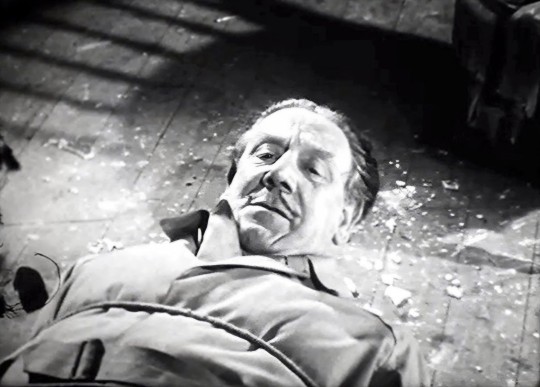
Inspector Morley, Late of Scotland Yard, Investigates: The Case of the Scarlet Letters (1.3, WGN-TV, 1952)
"Mr. Mullins, I have in my possession sixty-eight letters, none of which has begun to outlive its usefulness. I'm quite prepared to admit that blackmail is risky, but then murder has its disadvantages too - that is why I gave up murder."
#inspector morley late of scotland yard investigates#inspector morley late of scotland yard#(there's some confusion about the correct title of this series; it appears onscreen with 'investigates' but many online sources omit the#final word and it wouldn't be unique in having a title screen that differed slightly from the official name of the show; either way it's a#hell of an unwieldy name for your programme.....)#classic tv#1952#john gilling#victor m. gover#tod slaughter#patrick barr#tucker mcguire#leonard sharp#another rediscovered gem made available by the good folks at kaleidoscope#oof. ok. so the story of Inspector Morley is complicated and still semi mysterious (the show is 70 years old after all‚ there's precious#little surviving documentation). as far as it goes‚ this was a UK production intended for sale to the BBC (there existing no independent tv#company in 1952). the beeb‚ for whatever reason‚ passed on the series. 13 episodes had been made and of these about seven were cobbled#together into feature films to recoup some of the costs; those survived and saw occasional outings on rainy afternoon tv schedules here#it was thought that the remainder were junked‚ but research (not my own i hasten to add) has revealed that the whole series was in fact sol#to the US where it was shown on WGN (a Chicago based station i believe). when kaleidoscope recovered this particular episode some 6 or 7#years ago‚ it was thought to be the sole surviving episode‚ at least in its original format (ie. not edited into a feature). actually it#sounds like they might all exist and a few are even on youtube (including this one). this is very early detective tv and it shows its age#not just in its ropey visuals (it's all quite soft and fuzzy) but in its very old fashioned shape and design‚ which is closer to mid#century film than what television would shortly become. that sensation is only furthered by the presence of the immortal Tod Slaughter‚ a#bastion of early british cinema and one of the first horror icons the uk ever produced. unusually‚ it seems like he starred in most (if not#all) of the episodes of the series; unusual bc he plays the villain‚ opposite Barr's staunch ex copper Morley. having a recurring villain#must certainly have helped when editing the shows into films for cinema release but it was quite a strange choice for tv#tho perhaps a set cast reduced costs (this was clearly a budget production‚ tho it does feature some impressive early location shooting)#Slaughter is great fun‚ in full scenery chewing mode as the wicked and unrepentant mastermind behind all sorts of crimes#Barr even has personal beef with him‚ though it would require seeing the other eps to fully understand it i suspect
6 notes
·
View notes
Text
Wow, I think we must thank you sister for the wisdom AND Youtube😭 (you can find anything on Youtube, I swear💀You could even find how to hide bodies—)
You’re right about the ‘don’t give a shit’ part. More people should have this belief, me included. I think we would be more chill😭But also, yeah, most times in public, I literally do not give a fuck, so I agree with you😭It’s a good thought.
I HATE SPIDERS😭 (except for the little one that dances with the paws in the air) So we’ll die of a panic and THEN WHO’LL WRITE AMAZING GAY FICS?! WE SHALL NOT PERISH TO THE INSECTS!
Now I’ll tell people “I’m the ‘I can lock pick’ type’, nice to meet you.”
Reblog this post to ask mutuals to tell you their weirdest theory about u
#which can be use “in tanning; wool production; by launderers to clean and whiten woollen togas”#i knew of these facts BUT NOT OF THIS LAST ONE WOW#look at that and it’s only pee who would have thought#his public toilet to him so he dislike that taxe collector asshole 🚽#WOW everything can turn into a merthur fic AND I CAN TOTALLY SEE THIS😭#watch us use every part of human history and replace everyone with MERTHUR#au where the whole camelot start to use “gaius your uncle” because merlin got the job of manservant without needing to rise up in the#the nepotism we love to see🤭#this shit hits hard i love this#merlin literally had one of the best position ever in a court😭yeah okay sometimes it sucked but it was still better than most positions💀#merthur#bbc merlin#merlin bbc#merlin#arthur pendragon#reblog chain
21K notes
·
View notes
Text
for whom good omens is being written
Hey maggots and the rest of the fandom, it's the Good Omens Mascot here. Today I read a post about this tweet:

The accompanying video genuinely made me cry. And I've been thinking about this for a long while, as far back as February, when I saw a lot of conflicting opinions on what people wanted from the third season. It really is true that no matter what you do, some people will be dissatisfied. But what matters is that Neil is writing this for Terry.
And I was reminded of some paragraphs from the Good Omens TV Companion, which I'd read in Amazon's sample excerpt of the book. I know this is a long post, but I really truly do think you all need to read these, I've done my best to select only the most important parts. Here you go:
'His Alzheimer's started progressing harder and faster than either of us had expected,' says Neil, referring to a period in which Terry recognized that despite everything he could no longer write. 'We had been friends for over thirty years, and during that time he had never asked me for anything. Then, out of the blue, I received an email from him with a special request. It read: “Listen, I know how busy you are. I know you don't have time to do this, but I want you to write the script for Good Omens. You are the only human being on this planet who has the passion, love and understanding for the old girl that I do. You have to do this for me so that I can see it." And I thought, “OK, if you put it like that then I'll do it."
'I had adapted my own work in the past, writing scripts for Death: The High Cost of Living and Sandman, but not a lot else was seen. I'd also written two episodes of Doctor Who, and so I felt like I knew what I was doing. Usually, having written something once I'd rather start something new, but having a very sick co-author saying I had to do this?' Neil spreads his hands as if the answer is clear to see. 'I had to step up to the plate.' A pause, then: 'All this took place in autumn 2014, around the time that the BBC radio adaptation of Good Omens was happening,' he continues, referring to the production scripted and co-directed by Dirk Maggs and starring Peter Serafinowicz and Mark Heap. ‘Terry had talked me into writing the TV adaptation, and I thought OK, I have a few years. Only I didn't have a few years,' he says. 'Terry was unconscious by December and dead by March.'
He pauses again. 'His passing took all of us by surprise,' Neil remembers. 'About a week later, I started writing, and it was very sad. The moments Terry felt closest to me were the moments I would get stuck during the writing process. In the old days, when we wrote the novel, I would send him what I'd done or phone him up. And he would say, "Aahh, the problem, Grasshopper, is in the way you phrase the question," and I would reply, "Just tell me what to do!" which somehow always started a conversation. 'In writing the script, there were times I'd really want to talk to Terry, and also places where I'd figure something out and do something really clever, and I would want to share it with him. So, instead, I would text Terry's former personal assistant, Rob Wilkins, now his representative on Earth. It was the nearest thing I had.'
(...) As Neil himself recognizes, this is an adaptation built upon the confidence that comes from three decades of writing for page and screen. But for all the wisdom of experience, he found that above all one factor guided him throughout the process. 'Terry isn't here, which leaves me as the guardian of the soul of the story,' he explains. 'It's funny because sometimes I found myself defending Terry's bits harder or more passionately than I would defend my own bits. Take Agnes Nutter,' he says, referring to what has become a key scene in the adaptation in which the seventeenth-century author of the book of prophecies foretelling the coming of the Antichrist is burned at the stake. ‘It was a huge, complicated and incredibly expensive shoot, with bonfires built and primed to explode as well as huge crowds in costume. It had to feel just like an English village in the 1640s, and of course everyone asked if there was a cheap way of doing it. 'One suggestion was that we could tell the story using old-fashioned woodcuts and have the narrator take us through what happened, but I just thought, “No”. Because I had brought aspects of the story like Crowley and the baby swap along to the mix, and Terry created Agnes Nutter. So, if I had cut out Agnes then I wouldn't be doing right by the person who gave me this job. Terry would've rolled over in his grave.'
And, finally, this paragraph:
"Once again, Neil cites the absence of his co-writer as his drive to ensure that Good Omens translated to the screen and remained true to the original vision. 'Terry's last request to me was to make this something he would be proud of. And so that has been my job.'"
I think that's so heartwrenchingly beautiful, and so I wanted you all to read this, too, just in case you (like me) don't have the Good Omens TV Companion. It adds another layer of depth and emotion to this already complex and amazing story that we all know and love.
Share this post, if you can, please, so that more people can read these excerpts :")
Tagging @neil-gaiman, @fuckyeahgoodomens and @orpiknight, even if you've definitely read these before :)
#good omens#neil gaiman#sir terry pratchett#good omens show#good omens fandom#good omens mascot#weirdly specific but ok#asmi
15K notes
·
View notes
Text
Ask an older generation of white South Africans when they first felt the bite of anti-apartheid sanctions, and some point to the moment in 1968 when their prime minister, BJ Vorster, banned a tour by the England cricket team because it included a mixed-race player, Basil D’Oliveira. After that, South Africa was excluded from international cricket until Nelson Mandela walked free from prison 22 years later. The D’Oliveira affair, as it became known, proved a watershed in drumming up popular support for the sporting boycott that eventually saw the country excluded from most international competition including rugby, the great passion of the white Afrikaners who were the base of the ruling Nationalist party and who bitterly resented being cast out. For others, the moment of reckoning came years later, in 1985 when foreign banks called in South Africa’s loans. It was a clear sign that the country’s economy was going to pay an ever higher price for apartheid. Neither of those events was decisive in bringing down South Africa’s regime. Far more credit lies with the black schoolchildren who took to the streets of Soweto in 1976 and kicked off years of unrest and civil disobedience that made the country increasingly ungovernable until changing global politics, and the collapse of communism, played its part. But the rise of the popular anti-apartheid boycott over nearly 30 years made its mark on South Africans who were increasingly confronted by a repudiation of their system. Ordinary Europeans pressured supermarkets to stop selling South African products. British students forced Barclays Bank to pull out of the apartheid state. The refusal of a Dublin shop worker to ring up a Cape grapefruit led to a strike and then a total ban on South African imports by the Irish government. By the mid-1980s, one in four Britons said they were boycotting South African goods – a testament to the reach of the anti-apartheid campaign. . . . The musicians union blocked South African artists from playing on the BBC, and the cultural boycott saw most performers refusing to play in the apartheid state, although some, including Elton John and Queen, infamously put on concerts at Sun City in the Bophuthatswana homeland. The US didn’t have the same sporting or cultural ties, and imported far fewer South African products, but the mobilisation against apartheid in universities, churches and through local coalitions in the 1980s was instrumental in forcing the hand of American politicians and big business in favour of financial sanctions and divestment. By the time President FW de Klerk was ready to release Mandela and negotiate an end to apartheid, a big selling point for part of the white population was an end to boycotts and isolation. Twenty-seven years after the end of white rule, some see the boycott campaign against South Africa as a guide to mobilising popular support against what is increasingly condemned as Israel’s own brand of apartheid.
. . . continues at the guardian (21 May, 2021)
#israel#palestine#gaza#south africa#i think all of us need to seriously study the history and actions of the anti-apartheid movement#and apply these lessons to the israeli occupation
3K notes
·
View notes
Text
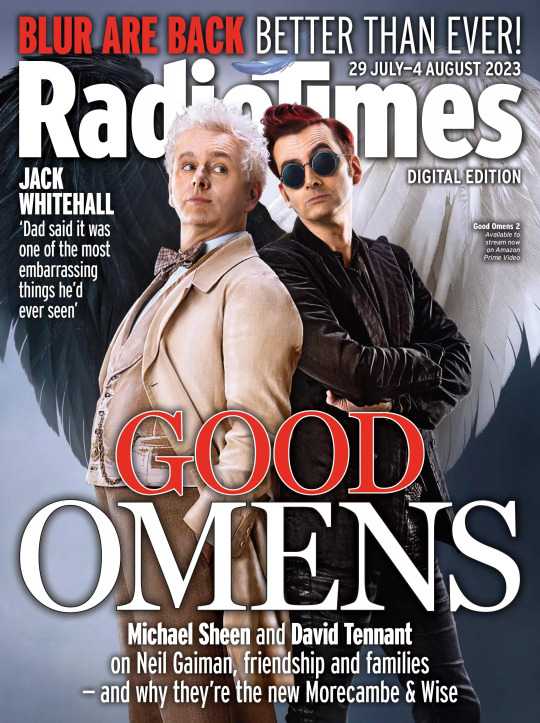
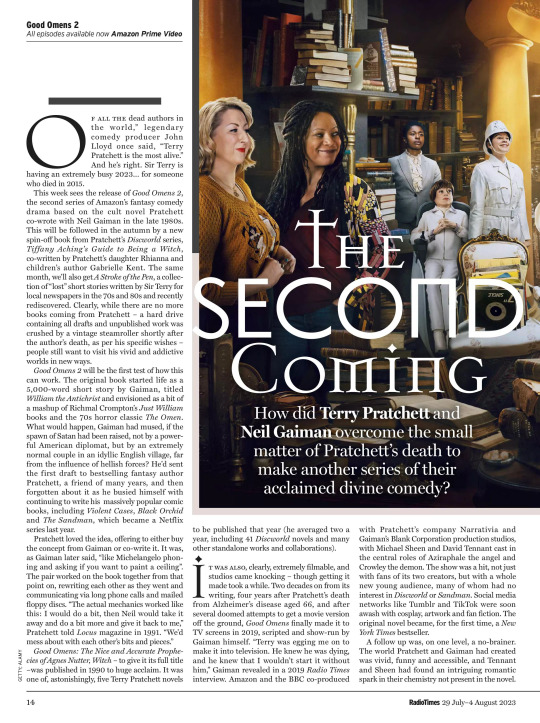
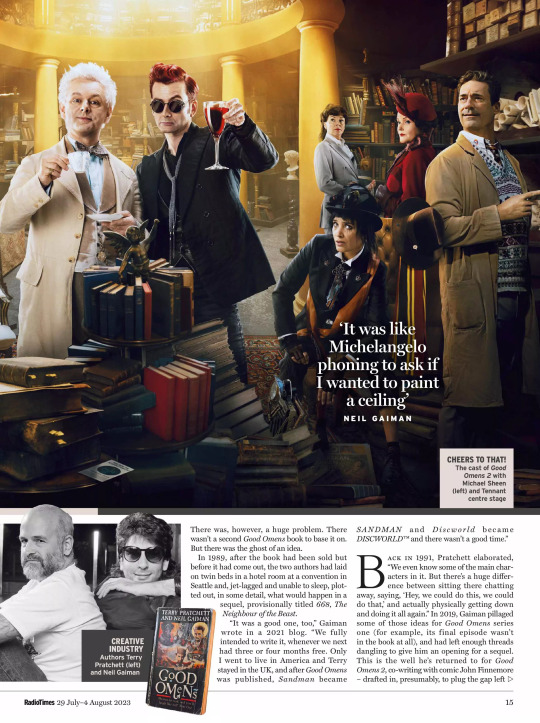
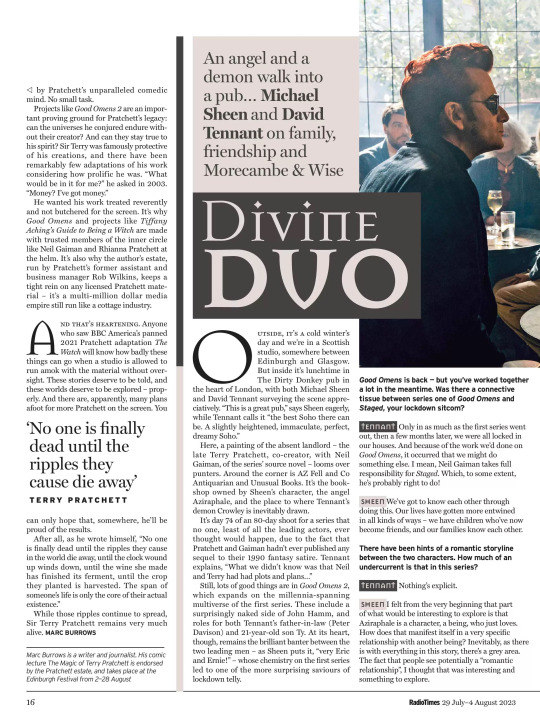
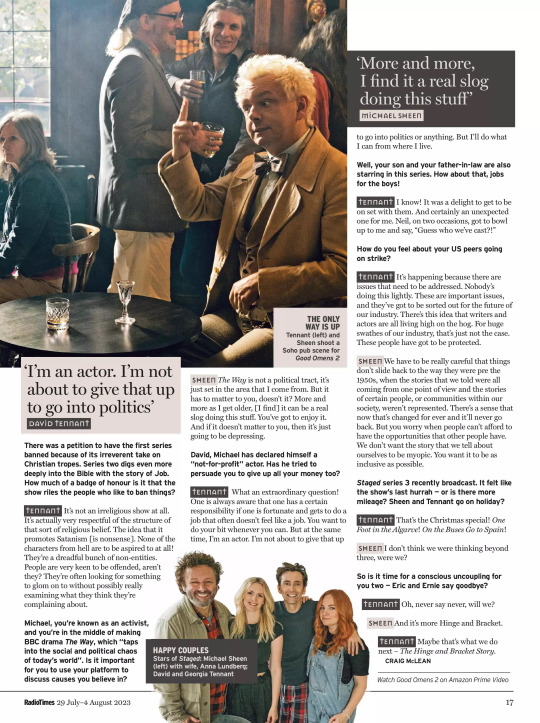
The Radio Times magazine from the 29 July-04 August 2023 :)
THE SECOND COMING
How did Terry Pratchett and Neil gaiman overcome the small matter of Pratchett's death to make another series of their acclaimed divine comedy?
For all the dead authors in the world,” legendary comedy producer John Lloyd once said, “Terry Pratchett is the most alive.” And he’s right. Sir Terry is having an extremely busy 2023… for someone who died in 2015.
This week sees the release of Good Omens 2, the second series of Amazon’s fantasy comedy drama based on the cult novel Pratchett co-wrote with Neil Gaiman in the late 1980s. This will be followed in the autumn by a new spin-off book from Pratchett’s Discworld series, Tiffany Aching’s Guide to Being a Witch, co-written by Pratchett’s daughter Rhianna and children’s author Gabrielle Kent. The same month, we’ll also get A Stroke of the Pen, a collection of “lost” short stories written by Sir Terry for local newspapers in the 70s and 80s and recently rediscovered. Clearly, while there are no more books coming from Pratchett – a hard drive containing all drafts and unpublished work was crushed by a vintage steamroller shortly after the author’s death, as per his specific wishes – people still want to visit his vivid and addictive worlds in new ways.
Good Omens 2 will be the first test of how this can work. The original book started life as a 5,000-word short story by Gaiman, titled William the Antichrist and envisioned as a bit of a mashup of Richmal Crompton’s Just William books and the 70s horror classic The Omen. What would happen, Gaiman had mused, if the spawn of Satan had been raised, not by a powerful American diplomat, but by an extremely normal couple in an idyllic English village, far from the influence of hellish forces? He’d sent the first draft to bestselling fantasy author Pratchett, a friend of many years, and then forgotten about it as he busied himself with continuing to write his massively popular comic books, including Violent Cases, Black Orchid and The Sandman, which became a Netflix series last year.
Pratchett loved the idea, offering to either buy the concept from Gaiman or co-write it. It was, as Gaiman later said, “like Michelangelo phoning and asking if you want to paint a ceiling” The pair worked on the book together from that point on, rewriting each other as they went and communicating via long phone calls and mailed floppy discs. “The actual mechanics worked like this: I would do a bit, then Neil would take it away and do a bit more and give it back to me,” Pratchett told Locus magazine in 1991. “We’d mess about with each other’s bits and pieces.”
Good Omens: The Nice and Accurate Prophecies of Agnes Nutter, Witch – to give it its full title –was published in 1990 to huge acclaim. It was one of, astonishingly, five Terry Pratchett novels to be published that year (he averaged two a year, including 41 Discworld novels and many other standalone works and collaborations).
It was also, clearly, extremely filmable, and studios came knocking — though getting it made took a while. rnvo decades on from its writing, four years after Pratchett's death from Alzheimer's disease aged 66, and after several doomed attempts to get a movie version off the ground, Good Omens finally made it to TV screens in 2019, scripted and show-run by Gaiman himself. "Terry was egging me on to make it into television. He knew he was dying, and he knew that I wouldn't start it without him," Gaiman revealed in a 2019 Radio Times interview. Amazon and the BBC co-produced with Pratchett's company Narrativia and Gaiman's Blank Corporation production studios, with Michael Sheen and David Tennant cast in the central roles of Aziraphale the angel and Crowley the demon. The show was a hit, not just with fans of its two creators, but with a whole new young audience, many of whom had no interest in Discworld or Sandman. Social media networks like Tumblr and TikTok were soon awash with cosplay, artwork and fan fiction. The original novel became, for the first time, a New York Times bestseller.
A follow up was, on one level, a no-brainer. The world Pratchett and Gaiman had created was vivid, funny and accessible, and Tennant and Sheen had found an intriguing romantic spark in their chemistry not present in the novel.
There was, however, a huge problem. There wasn't a second Good Omens book to base it on. But there was the ghost of an idea.
In 1989, after the book had been sold but before it had come out, the two authors had laid on fivin beds in a hotel room at a convention in Seattle and, jet-lagged and unable to sleep, plotted out, in some detail, what would happen in a sequel, provisionally titled 668, The II Neighbour of the Beast.
"It was a good one, too" Gaiman wrote in a 2021 blog. "We fully intended to write it, whenever we next had three or four months free. Only I went to live in America and Terry stayed in the UK, and after Good Omens was published, Sandman became SANDMAN and Discworld became DISCWORLD(TM) and there wasn't a good time."
Back in 1991, Pratchett elaborated, "We even know some of the main characters in it. But there's a huge difference between sitting there chatting away, saying, 'Hey, we could do this, we could do that,' and actually physically getting down and doing it all again." In 2019, Gaiman pillaged some of those ideas for Good Omens series one (for example, its final episode wasn't in the book at all), and had left enough threads dangling to give him an opening for a sequel. This is the well he's returned to for Good Omens 2, co-writing with comic John Finnemore - drafted in, presumably, to plug the gap left Pratchett's unparalleled comedic mind. No small task.
Projects like Good Omens 2 are an important proving ground for Pratchett's legacy: can the universes he conjured endure without their creator? And can they stay true to his spirit? Sir Terry was famously protective of his creations, and there have been remarkably few adaptations of his work considering how prolific he was. "What would be in it for me?" he asked in 2003. "Money? I've got money."
He wanted his work treated reverently and not butchered for the screen. It's why Good Omens and projects like Tiffany Aching's Guide to Being a Witch are made with trusted members of the inner circle like Neil Gaiman and Rhianna Pratchett at the helm. It's also why the author's estate, run by Pratchett's former assistant and business manager Rob Wilkins, keeps a tight rein on any licensed Pratchett material — it's a multi-million dollar media empire still run like a cottage industry.
And that's heartening. Anyone who saw BBC America's panned 2021 Pratchett adaptation The Watch will know how badly these things can go when a studio is allowed to run amok with the material without oversight. These stories deserve to be told, and these worlds deserve to be explored — properly. And there are, apparently, many plans afoot for more Pratchett on the screen. You can only hope that, somewhere, he'll be proud of the results.
After all, as he wrote himself, "No one is finally dead until the ripples they cause in the world die away, until the clock wound up winds down, until the wine she made has finished its ferment, until the crop they planted is harvested. The span of someone's life is only the core of their actual existence."
While those ripples continue to spread, Sir Terry Pratchett remains very much alive. MARC BURROWS
DIVINE DUO
An angel and a demon walk into a pub... Michael Sheen and David Tennant on family, friendship and Morecambe & Wise
Outside it's cold winter's day and we're in a Scottish studio, somewhere between Edinburgh and Glasgow. But inside it's lunchtime in The Dirty Donkey pub in the heart of London, with both Michael Sheen and David Tennant surveying the scene appreciatively. "This is a great pub," says Sheen eagerly, while Tennant calls it "the best Soho there can be. A slightly heightened, immaculate, perfect, dreamy Soho."
Here, a painting of the absent landlord — the late Terry Pratchett, co-creator, with Neil Gaiman, of the series' source novel — looms over punters. Around the corner is AZ Fell and Co Antiquarian and Unusual Books. It's the bookshop owned by Sheen's character, the angel Aziraphale, and the place to where Tennant's demon Crowley is inevitably drawn.
It's day 74 of an 80-day shoot for a series that no one, least of all the leading actors, ever thought would happen, due to the fact that Pratchett and Gaiman hadn't ever published any sequel to their 1990 fantasy satire. Tennant explains, "What we didn't know was that Neil and Terry had had plots and plans..."
Still, lots of good things are in Good Omens 2, which expands on the millennia-spanning multiverse of the first series. These include a surprisingly naked side of John Hamm, and roles for both Tennant's father-in-law (Peter Davison) and 21-year-old son Ty. At its heart, though, remains the brilliant banter between the two leading men — as Sheen puts it, "very Eric and Ernie !" — whose chemistry on the first series led to one of the more surprising saviours of lockdown telly.
Good Omens is back — but you've worked together a lot in the meantime. Was there a connective tissue between series one of Good Omens and Staged, your lockdown sitcom?
David: Only in as much as the first series went out, then a few months later, we were all locked in our houses. And because of the work we'd done on Good Omens, it occurred that we might do something else. I mean, Neil Gaiman takes full responsibility for Staged. Which, to some extent, he's probably right to do!
Michael: We've got to know each other through doing this. Our lives have gotten more entwined in all kinds of ways — we have children who've now become friends, and our families know each other.
There have been hints of a romantic storyline between the two characters. How much of an undercurrent is that in this series.
David: Nothing's explicit.
Michael: I felt from the very beginning that part of what would be interesting to explore is that Aziraphale is a character, a being, who just loves. How does that manifest itself in a very specific relationship with another being? Inevitably, as there is with everything in this story, there's a grey area. The fact that people see potentially a "romantic relationship", I thought that was interesting and something to explore.
There was a petition to have the first series banned because of its irreverent take on Christian tropes. Series two digs even more deeply into the Bible with the story of Job. How much of a badge of honour is it that the show riles the people who like to ban things?
David: It's not an irreligious show at all. It's actually very respectful of the structure of that sort of religious belief. The idea that it promotes Satanism [is nonsense]. None of the characters from hell are to be aspired to at all! They're a dreadful bunch of non-entities. People are very keen to be offended, aren't they? They're often looking for something to glom on to without possibly really examining what they think they're complaining about.
Michael, you're known as an activist, and you're in the middle of Making BBC drama The Way, which "taps into the social and political chaos of today's world". Is it important for you to use your plaform to discuss causes you believe in?
Michael: The Way is not a political tract, it's just set in the area that I come from. But it has to matter to you, doesn't it? More and more as I get older, [I find] it can be a real slog doing this stuff. You've got to enjoy it. And if it doesn't matter to you, then it's just going to be depressing.
David, Michael has declared himself a "not-for-profit" actor. Has he tried to persuade you to give up all your money too?
David: What an extraordinary question! One is always aware that one has a certain responsibility if one is fortunate and gets to do a job that often doesn't feel like a job. You want to do your bit whenever you can. But at the same time, I'm an actor. I'm not about to give that up to go into politics or anything. But I'll do what I can from where I live.
Well, your son and your father-in-law are also starring in this series. How about that, jobs for the boys!
David: I know! It was a delight to get to be on set with them. And certainly an unexpected one for me. Neil, on two occasions, got to bowl up to me and say, "Guess who we've cast?!"
How do you feel about your US peers going on strike?
David: It's happening because there are issues that need to be addressed. Nobody's doing this lightly. These are important issues, and they've got to be sorted out for the future of our industry. There's this idea that writers and actors are all living high on the hog. For huge swathes of our industry, that's just not the case. These people have got to be protected.
Michael: We have to be really careful that things don't slide back to the way they were pre the 1950s, when the stories that we told were all coming from one point of view and the stories of certain people, or communities within our society, weren't represented. There's a sense that now that's changed for ever and it'll never go back. But you worry when people can't afford to have the opportunities that other people have. We don't want the story that we tell about ourselves to be myopic. You want it to be as inclusive as possible
Staged series 3 recently broadcast. It felt like the show's last hurrah — or is there more mileage? Sheen and Tennant go on holiday?
David: That's the Christmas special! One Foot in the Algarve! On the Buses Go to Spain!
Michael: I don't think we were thinking beyond three, were we?
So is it time for a conscious uncoupling for you two — Eric and Ernie say goodbye?
David: Oh, never say never, will we?
Michael: And it's more Hinge and Bracket.
David: Maybe that's what we do next — The Hinge and Bracket Story. CRAIG McLEAN
#good omens#gos2#season 2#radio times#radio times 2023#interview#magazines#neil gaiman#terry pratchett#david tennant#michael sheen#david interview#michael interview#neil interview#terry interview#bts#fun fact#staged#the way#s2 interview#transcripts
895 notes
·
View notes
Text
Behold John Hurt as the rose-fingered goddess Dawn

(technically it's John Hurt as Caligula as Dawn, but I'll take every opportunity to remind everyone I, Claudius is there for all your War! Doctor and Master ancient Rome AU needs)
we need to have all the doctor who actors from doctor who dress in drag. we have colin baker, david tennant & peter capaldi already. when will it be everyone else's turn. get on it fellas
#derek jacobi is the titular emperor claudius and this is seriously one of bbc's most critically acclaimed productions#the dance starts around 30:30 timestamp#[it's so good i included a nod in my valiant playlist fic]
689 notes
·
View notes
Text



Among TV’s most delightfully haunted settings, BBC’s 𝑮𝒉𝒐𝒔𝒕𝒔 shines with its eccentric manor, filled with spectral adventures. In the 2021 episode 𝑻𝒉𝒆 𝑩𝒐𝒏𝒆 𝑷𝒍𝒐𝒕, Chloé Delanney graced the screen wearing this stunning French hood. This elegant piece, designed by Margaret Furse, boasts a rich history beyond the series. It has made appearances in various film and television productions, including Daphne Slater’s portrayal of Queen Mary I in the 1971 𝑬𝒍𝒊𝒛𝒂𝒃𝒆𝒕𝒉 𝑹 and Geneviève Bujold’s role as Anne Boleyn in 𝑨𝒏𝒏𝒆 𝒐𝒇 𝒕𝒉𝒆 𝑻𝒉𝒐𝒖𝒔𝒂𝒏𝒅 𝑫𝒂𝒚𝒔 in 1969. This beautifully detailed piece has been used many more times throughout the years. To find out more, visit our page dedicated to this costume at bit.ly/Acces004
#Halloween#BBCGhosts#Ghosts#AnneoftheThousandDays#ElizabethR#GenevièveBujold#DaphneSlater#ChloéDelanney#RecycledMovieCostumes#halloweeneveryday#31DaysofHalloween#Costumes#Costume
137 notes
·
View notes
Note
Do you have any nature documentaries you would recommend? I find a lot of them too sensationalized and not informative enough for my tastes
I think 'Nature' on PBS is like. THE best single show overall. It's been running since as long as I can remember and has a ton of episodes (most of the older seasons aren't available anymore though). It has different people involved with each production can have pretty significant variety in tone and approach, so some episodes are kinda flops but it never really falls into that wild crazy over-sensationalized end of the spectrum (just like. goofy or boring at worst). A lot of the time they tend to follow specific wildlife biologists working with the subject matter so you get an especially detailed look and expert perspectives involved. You can watch a good deal of them for free on the PBS website/youtube channel but some require a PBS subscription (I haven't found them streaming for free elsewhere)
BBC tends to make some of the the better nature docs out of the major networks like I think Planet Earth (and its sequel), Blue Planet (and its sequel), Frozen Planet, and Seven Worlds One Planet are all very good. BBC 'The Mating Game' falls into all the silliness one might expect but is also pretty solid and stood out to me because I realized I had NEVER seen homosexual behavior depicted in a nature documentary (depicts pair bonded female albatross at one point)
Prehistoric Planet is also excellent on the off chance you haven't seen it (there can be some nitpicks on like anatomical accuracy and the feasibility of some of the speculative behavior but this is like BY FAR by best quality dinosaur media I've ever seen).
I also accumulated a small playlist of nature docs on youtube that I thought were solid a couple years back. You can find some really good stuff available for free on youtube like there's a TON of nature docs out there, a lot of them pretty niche stuff or low budget but solid independent projects (just make sure you have a functional ad blocker because they're generally uploaded by specific channels laden with ads for the revenue)
#The youtube ones I saved might be kinda hit or miss. I think I saved a few solely on the basis of having a rarer subject matter#Also may have been watching most of them on edibles at the time
202 notes
·
View notes
Text
The near future in the Doctor Who universe sure gets dire doesn't it? Especially if Mad Jack / Roger ap Gwilliam is still part of history.
I thought I'd have a bit of fun listing things out, combining as many sources as possible. Turns out he fits in shockingly well with what we know. There's a lot missing here or cut out, and for obvious reasons it's very UK / Europe focused, but nonetheless:
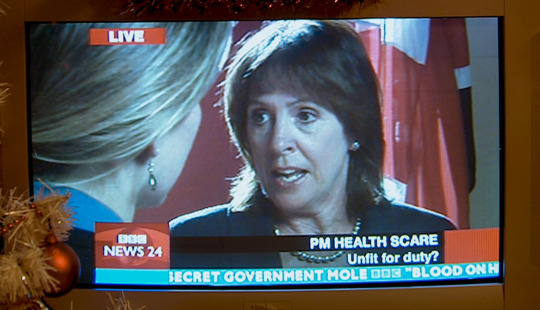
[ID: Scene from The Christmas Invasion showing Harriet Jones on BBC News. The news ticker reads "PM HEALTH SCARE", "Unfit for duty?", and references a "SECRET GOVERNMENT MOLE" and a quote: "BLOOD ON [HER HANDS]".]
2006-2021 (obviously the past now, but still noting for the resulting temporal and political butterfly effect) - In the original timeline, Harriet Jones remains Prime Minister for 3 consecutive terms, presumably 15 years assuming no snap election was called, referred to as a 'golden age' [World War Three]. The Tenth Doctor deliberately changes history to cause her deposal [The Christmas Invasion], leading to numerous disastrous terms in the meantime, including those of Harold Saxon [The Sound of Drums et al.], Brian Green (who tried to appease the 456) [Children of Earth], Boris Johnson (an auton host of the Nestene Consciousness) [Rose (novelisation)], and Jo Patterson (responsible for deploying cloned Dalek defence drones in the UK's streets) [Revolution of the Daleks].
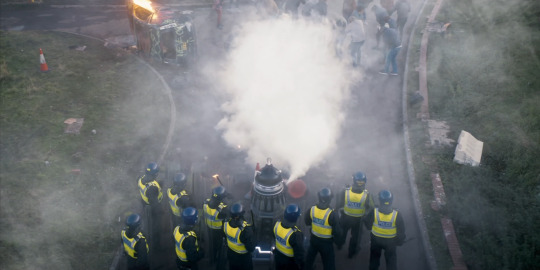
[ID: Scene from Revolution of the Daleks. A 'defence drone' Dalek is used to support anti-riot police in a test, dispersing protestors with mock tear gas.]
2010s-2030s - The European Union gradually integrates further, eventually becoming the European Zone / Eurozone, a global superpower which competes with the USA through the 21st century. The UK eventually forms part of the bloc [Trading Futures].
It's likely that Harriet Jones's deposal led to this and related events being delayed or erased, with Brexit (driven by, among others, one of Jones's successors in the new timeline) reducing european unity. Most notably, Ramón Salamander's rise to power occurs now not in the 2010s [The Enemy of the World], but in the 2030s [Doctor Who and the Enemy of the World]. There are other events that are seemingly delayed by ~20 years by changes to the timeline, including future events like the dictatorship of Mariah Learman [The Time of the Daleks, Trading Futures], and yet also possibly past events like the death of Queen Elizabeth II [Battlefield, The Longest Night et al.], which may suggest something else (eg. the Time War) may be responsible.
~2030 - During a time of rising global tensions [73 Yards], Ramón Salamander convinces a group of scientists in an underground shelter endurance experiment that nuclear war has broken out on the surface. They are convinced to generate artificial "natural" disasters to fight back against the enemy. Between this and ongoing climate change, several global food sources collapse as a result, including Canada and Ukraine's corn and flour production [The Enemy of the World].
2031 - Tensions culminate in the "Great Russian War". Despite posturing, not a single nuclear weapon is fired, at least by NATO [73 Yards]. This may be later considered World War III [Trading Futures].
~2032-2035 - Following the war, tensions rise again, now between the Eurozone and the USA [Trading Futures], possibly in reaction to actions (or lack thereof?) taken by NATO during the war [73 Yards]. Both send separate peacekeeping forces to conflict in North Africa. Meanwhile, Italy is engaged in civil war [Trading Futures].
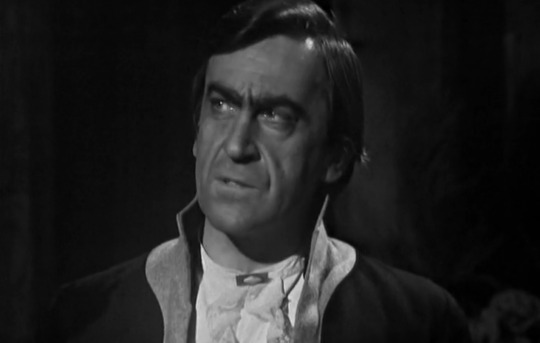
[ID: Scene from The Enemy of the World, showing Ramón Salamander.]
Over the decade, Ramón Salamander rises in power in the World Zone Authority, using his patented "Sun Store" satellite technology to aid the growth of crops by controlling sunlight over agricultural regions. In the background, he murders and blackmails officials to place loyalists into powerful positions, with the goal of ruling over the World Zone Authority as a dictator. Salamander's treachery is later discovered and he disappears [The Enemy of the World].
2037 - 2042 - Several militia declare wars of Independence from the USA. Notably, Phoenix, Arizona is destroyed in a terrorist attack. While the country largely persists after the conflicts, some territories seem to successfully secede - with, for example, a Montana Republic seemingly being in existence in 2054 [Alien Bodies].
2038 - The World Zones Accord is signed. This is later considered to have reduced the United Nations to a 'joke' compared with the World Zone Authority [Alien Bodies]. Given the extensive power it gives to the WZA, this was likely originally part of Salamander's plan, but due to his disappearance he is not around to reap the rewards [The Enemy of the World].
2039 - A group of Mexican astronauts studying minerals on the Moon go missing [Kill the Moon].
~2030s - 2040s - The Earth begins to experience major climate change effects, including "appalling storm conditions" which harm agriculture [The Waters of Mars]. The ice caps melt and flood much of the Earth [K9] with nations like the Netherlands ending up entirely flooded [St Anthony's Fire]. Some regions experience corrosive acid rain [Cat's Cradle: War Head, Strange Loops]. One summer sees Britain experience a 22 week drought. At this time, the Eurozone closes its borders to millions of North African and Baltic Sea refugees [Hothouse]. This time period may be known as the "Oil Apocalypse" [The Waters of Mars].

[ID: Scene from K9 Episode 13: Aeolian. Big Ben stands in the middle of a colossal storm of wind and rain.]
With Earth's ecosystems collapsing [Davros], humanity begin to realise it's facing extinction [The Waters of Mars]. An artificial cooling agent is spread in the atmosphere to semi-successfully combat the effects, but leads to dramatic side-effects, including freezing some areas of the globe. This is known as the "Great Cataclysm" [K9].
2041 - A three-human team, including Adelaide Brooke, lands on Mars for the first time [The Waters of Mars]. However, with this accomplishment, and increasing turbulence on Earth, Humanity gradually loses interest in space exploration [Kill the Moon].
Before 2045 - Around this time, the UK falls into a dictatorship ruled by the "Director", head of a military council that has allegedly (secretly?) controlled the government since 2028 [Britain Protests]. It is possible that this Director was previously the "Minister of War" for previous governments [Before the Flood].
2045 - The World Zones Authority evolves into a World Government, with Nikita Bandranaik being elected President. The UK is not part of the organisation [This is 2065].
2046-2050s - The Director is overthrown [Down with the Director] and the rest of the government "collapses in shame" [73 Yards]. Some of the revolutionaries celebrate now being "masters of [their] own country" [Down with the Director]. Despite the hopes of the World Government for international integration, this nationalistic streak continues.

[ID: Scene from 73 Yards. Roger ap Gwilliam, with an Albion Party ribbon on his chest declares victory on BBC News, live from Kennington High in London. Headline reads "LANDSLIDE VICTORY FOR ALBION PARTY: Majority of 92 predicted. Roger ap Gwilliam declared Prime Minister."]
Roger ap Gwilliam is elected Prime Minister, with the far-right nationalistic Albion Party gaining a majority of 92 MPs [73 Yards]. While his government does take the step to officially join the World Government senate [Down with the Director], he seeks greater independence from other nations. One of his first actions is to expand the UK's nuclear arsenal, purchasing missiles from Pakistan and withdrawing from NATO. In his term, the world is brought to the brink of nuclear war [73 Yards], likely in the pre-2050s "Euro Wars" [The Time of the Daleks].
In this time, the "Department", a (private?) multinational security organisation is born, based primarily in the UK. They gain broad powers, which they use to control populations with propaganda and use of "CCPC"s: robotic law enforcement notorious for their surveillance and brutality. Despite its recent revolution, the country is rendered practically a police state [K9].
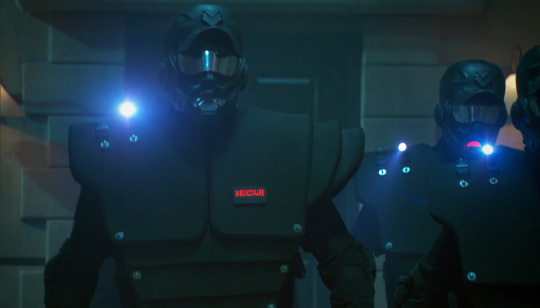
[ID: Scene from K9 Episode 1: Regeneration. CCPCs, hulking police robots, march down a dark alley.]
2049 - The Moon starts to dramatically gain mass, causing massive tides on the Earth, flooding entire cities. In a last ditch at survival, humanity plans to try and destroy the Moon using an array of nuclear bombs. Despite the people of Earth being offered the vote on what to do by turning off their lights, it appears the decision is made on a national level, with lights going off grid-by-grid. Nonetheless, the Moon is allowed to hatch, leaving behind a new less massive egg "moon" with minimal further destruction [Kill the Moon].
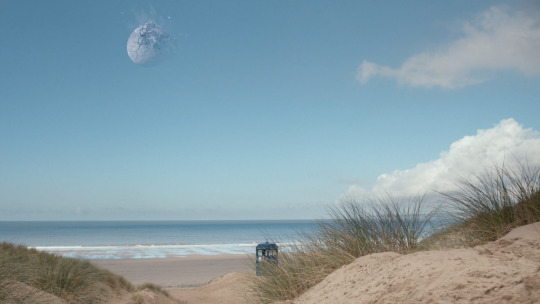
[ID: Scene from Kill the Moon. The Moon hatches in the background, as the TARDIS stands by the sea.]
Humanity's interest in space exploration returns [Kill the Moon], starting a new space race. Among these projects, Australia begins constucting a space elevator, Spain a project called "SpaceLink", while Germany and Russia each begin a series of new Moon missions. The Philippines are rumoured to be planning their own landing on Mars [The Waters of Mars].
~2050 - The UK Government (ap Gwilliam's?) is couped once more, by General Mariah Learman. With the King's permission, elections are suspended for at least a couple years, with her ruling over a "benevolent dictatorship". She is later abducted and forcibly mutated by the Daleks [The Time of the Daleks]. Despite the previous description, her promotion of Shakespeare in schools is remembered as the only good thing about her rule [Trading Futures]. (Note: As mentioned prior, it's likely that Learman's rule may have been delayed as Salamander's was. This is suggested by the mention of her in Trading Futures, set seemingly ~2030s or earlier, despite The Time of the Daleks taking place around the 2050s.)
~2050s - The Gravitron is built on the new Moon. This is used to artificially control the tides and weather [The Moonbase]. It likely also is intended to study and monitor the new Moon for future changes [Kill the Moon].
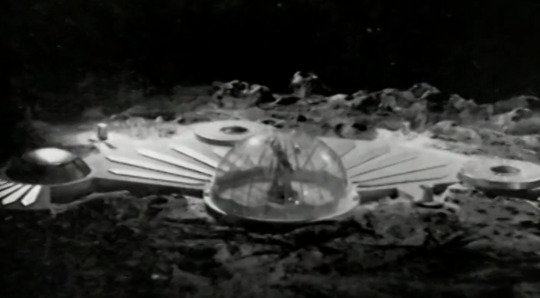
[ID: Scene from The Moonbase, giving an external shot of the base.]
2058 - 2059 - Bowie Base One is established: humanity's first colony on another planet and an international collaboration between the UK, USA, Russia, Germany, Turkey, South Korea, Lithuania, Australia, and Pakistan. One year later, it is mysteriously destroyed in a deliberately triggered nuclear explosion. In the original timeline, there were no survivors. However, after the interference of the Time Lord Victorious, the true story is eventually told on Earth. Regardless "a veil of darkness" sweeps over the planet over the next few years. [The Waters of Mars], as international tensions heat up once more... [Total Eclipse of the Heart].
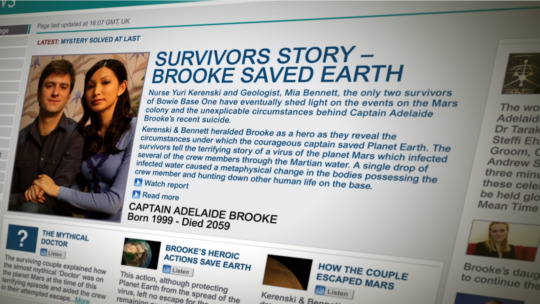
[ID: Scene from The Waters of Mars, showing an internet news website. Various articles appear focused on the Bowie Base One incident, including "SURVIVORS STORY - BROOKE SAVED EARTH", "THE MYTHICAL DOCTOR", "BROOKE'S HEROIC ACTIONS SAVE EARTH", and "HOW THE COUPLE ESCAPED MARS". The feature image shows the two survivors: Yuri Kerenski and Mia Bennett.]
2060s - The "Great War" breaks out on Earth, involving every country on Earth. This is likely World War IV. Details are vague, but it ultimately ends in a ceasefire, when it's realised the conflict is risking Earth's habitability [Total Eclipse of the Heart].
339 notes
·
View notes
Text
Anniversary Tournament
Last year for Doctor Who's anniversary I ran a tournament between Doctor Who stories, and I wanted to so something different again this year. A tournament between real people important to the history of Doctor Who, actors, writers, producers, directors, composers, production designers. Technically it'll be a tournament for the most infuential person to Doctor Who and its development over the years, but really I want it to be a celebration of all of these people, and not just the winner.
To that end, the nomination form, you can also submit nominations normally, ie sending me an ask or replying to this post, however I won't be accepting propaganda through those methods.
I'm thinking I'll close nominations on the 18th of November, that might change but probably not by much
Current Nominations:
if green then at least one person has submitted propaganda for them
Actors
Arthur Darvil
Billie Piper
Carole Ann Ford
Christopher Eccleston
Colin Baker
David Graham and Peter Hawkins
David Tennant
Frazer Hines
Freema Agyeman
India Fisher
Jacqueline Hill
Jodie Whittaker
John Simm
Jon Pertwee
Lisa Bowerman
Liz Sladen
Matt Smith
Ncuti Gatwa
Nicholas Courtney
Pat Gorman
Patrick Troughton
Paul McGann
Peter Capaldi
Peter Davison
Rodger Delgado
Sean Carlsen
Sophie Aldred
Stuart Fell
Sylvester McCoy
Tom Baker
William Hartnell
William Russell
Composer
Delia Derbyshire
Dudley Simpson
Murray Gold
Paddy Kingsland
Peter Howell
Rob Harvey
Ron Grainer
Segun Akinola
The BBC Radiophonic Workshop
Designers
June Hudson
Peter Brachacki
Raymond Cusic
Directors
Christopher Barry
Graeme Harper
Paddy Russell
Rachel Talalay
Richard Martin
Waris Hussein
Fandom
Marnal Gate
TARDIS wiki creator
The Audience
Craig Ferguson
Producers
Barry Letts
Graham Williams
John Nathan Turner
Philip Hinchcliffe
Verity Lambert
Julie Gardner
Writers (including script editors and showrunners)
Alan Moore
Anthony Coburn
Chris Chibnall
David Whittaker
Donald Wilson
Douglas Adams
Eric Saward
Gerry Davis
Grant Morrison
John Lucarotti
Johnathan Blum
Justine Richards
Kate Orman
Kit Pedler
Lance Parkin
Lawrence Miles
Marc Platt
Paul Cornell
Robert Holmes
Robert Shearman
Rona Munro
Russell T Davies
Steven Moffatt
Terrance Dicks
Terry Nation
Other/impossible to categorise
all the thousands of people who've worked behind the scenes
Michael Grade (BBC higherup who hated doctor who so so much)
Peter Cregeen (actually cancelled Doctor Who)
Sydney Newman
Nicholas Briggs
Gary Russell
John F Kennedy
Sue from Catering
The real historical figures who've appeared in the show
Shakespeare
106 notes
·
View notes
Note
Genuine question, isn't good omens a British show? Why does the wga strike interfere in it? It's bc you're part of the guild? Or bc of the streaming? I'm all for the strike, I'm just curious how American media ends up effecting other shows that aren't American.
Good Omens season 1 was an Amazon and BBC co-production. Good Omens Season 2 is an Amazon production, with Amazon using BBC Studios to make it for them. Most of the people working on the show are being paid by the BBC.
I was paid directly by Amazon, however, because I'm a WGA member and Amazon is a WGA signatory, which the BBC is not. Which means I get health insurance, pension contributions, all that stuff, while I write a show for an American company that's being filmed in the UK.
2K notes
·
View notes
Text
National Geographic is freshening up its programming slate.
The network has ordered four new series including The Real Finding Nemo and Surviving Pompeii with Tom Hiddleston.
It is the first slate of programming since it emerged that a large number of Nat Geo titles including Life Below Zero and Wicked Tuna were coming to an end.
Surviving Pompeii with Tom Hiddleston is a historical exploration about the eruption of Vesuvius in 79 A.D. and the preserved Roman city it left behind. Hiddleston, who studied Classics at Cambridge University, exec produces alongside his Loki executive producer Kevin R. Wright.
It comes from Plimsoll Productions, which is behind Nat Geo series including A Real Bug’s Life and The Devil’s Climb. Grant Mansfield, Alan Eyres, Helen Flint and Tom Barbor-Might exec produce for Plimsoll and Carolyn Payne exec produces for Nat Geo.
Hiddleston is the latest celebrity to front a Nat Geo series after Chris Hemsworth, who hosted Limitless and Will Smith with Welcome To Earth.
The Real Finding Nemo (w/t) comes on the back of A Real Bug’s Life. It will explore dynamics of life on the reef and beyond via a clown fish.
The series comes from Our Great National Parks producer Freeborne Media, whose James Honeyborne exec produces alongside Tracy Rudolph Jackson for Nat Geo.
Elsewhere, Ryan Reynolds’ Maximum Effort and BBC Studios Science Unit have teamed on Meet The Planets (w/t), an astronomy series that brings the galaxy’s most famous family to life, with the sun as the matriarch, surrounded by her unruly planetary children. It will feature comedy and animation.
Andrew Cohen exec produces for BBC Studios Science Unit alongside Betsy Forhan for Nat Geo.
Finally, the network is expanding its One Day In strand with Diana: One Day In Paris. The three-part series will explore the tragic death of Princess Diana on the 30th anniversary of that paparazzi car chase through a Parisian motorway tunnel.
It follows 9/11: One Day in America and JFK: One Day in America and comes from 72 Films.
It will feature rare archives and interviews with witnesses who have never spoken publicly as it looks at the 24 hours before and after Diana’s death and follow the story through to her funeral one week later.
David Glover and Mark Raphael exec produce for 72 Films alongside Carolyn Payne for Nat Geo and TJ Martin and Dan Lindsay.
All of this comes after Nat Geo axed Wicked Tuna earlier this summer. The Pilgrim Media Group-produced series, which follows a group of fisherman from Gloucester, Masschusetts as they rod and reel fish bluefin tuna, had been airing on the network since 2012 and 13 seasons.
Nat Geo’s Emmy-winning series Life Below Zero is also ending after its 23rd season, per star Chip Hailstone. Spinoffs including Next Generation, First Alaskans and Northern Territories are also ending.
Other titles not returning to Nat Geo include The Incredible Dr Pol, after 24 seasons, and Dr. Oakley Yukon Vet, after 12 seasons.
“These new unscripted series epitomize everything National Geographic stands for — bold, captivating storytelling rooted in world-class research and expertise,” said Tom McDonald, EVP of Global Unscripted and Factual Content. “National Geographic is building on its reputation as the home of the most distinctive factual series from the very best storytellers in the world.”

79 notes
·
View notes